Artificial Intelligence (AI) has revolutionized various industries, including healthcare. As technology continues to advance, so does the role of AI in providing streamlined and efficient healthcare services. In this article, we will explore the top AI medical software that is expected to redefine the healthcare landscape in 2024.
Understanding the Role of AI in Healthcare
AI plays a significant role in various aspects of healthcare and has the potential to transform medical diagnosis, improve the accuracy of diagnoses, streamline data management, and enhance patient care outcomes. By automating certain tasks, analyzing vast amounts of data, and providing decision support, AI-powered software can assist healthcare professionals in making more informed and efficient decisions.
From virtual assistants that aid in symptom checking to comprehensive health data management systems, AI medical software has shown great potential in improving patient care, optimizing resource allocation, and empowering healthcare professionals. These current applications of AI in medical care are just the beginning of the transformative role that AI will play in shaping the future of healthcare.
These AI-powered solutions aim to enhance medical diagnosis, streamline health data management, and revolutionize various healthcare practices. Let’s delve into some of the most promising AI medical software in 2024:
- Hippocratic
- Merative
- Viz
- Enlitic
- Regard
- Twill Health
- Linus Health
- PathAI
- Buoy Health
- Freenome
- VirtuSense
- Caption Health
- Tempus
- Cleerly
Hippocratic AI: Enhancing Medical Diagnosis

Hippocratic AI is an intelligent software that has the potential to transform medical diagnosis. By analyzing vast amounts of patient data, Hippocratic AI can assist healthcare professionals in identifying potential medical conditions more accurately and efficiently. The software uses machine learning algorithms to learn from a large pool of medical cases, providing a higher level of diagnostic accuracy.
For example, imagine a scenario where a patient presents with symptoms that could be indicative of multiple conditions. Hippocratic AI can analyze the patient’s medical history, laboratory results, and even genetic information to generate a comprehensive diagnostic report. This report not only suggests the most likely diagnosis but also provides insights into potential treatment options and prognosis.
Furthermore, Hippocratic AI continuously learns and updates its knowledge base, incorporating the latest medical research and advancements. This ensures that healthcare professionals have access to the most up-to-date information when making diagnostic decisions.
Merative: Streamlining Health Data Management

Managing and organizing health data is crucial for delivering efficient healthcare services. Merative is an AI medical software that offers a comprehensive solution for health data management. It utilizes natural language processing and machine learning techniques to extract relevant information from patient records, enabling healthcare providers to access critical data more easily and make informed decisions.
With Merative, healthcare organizations can overcome the challenges of dealing with large volumes of unstructured data. The software automatically categorizes and tags patient records, making it easier to search for specific information. Additionally, Merative can identify patterns and trends in the data, providing valuable insights for population health management and research purposes.
Imagine a scenario where a healthcare provider wants to analyze the effectiveness of a specific treatment protocol for a certain condition. With Merative, they can quickly gather data from patient records, extract relevant information, and analyze the outcomes. This allows for evidence-based decision-making and the continuous improvement of healthcare practices.
Viz.ai: Revolutionizing Stroke Detection
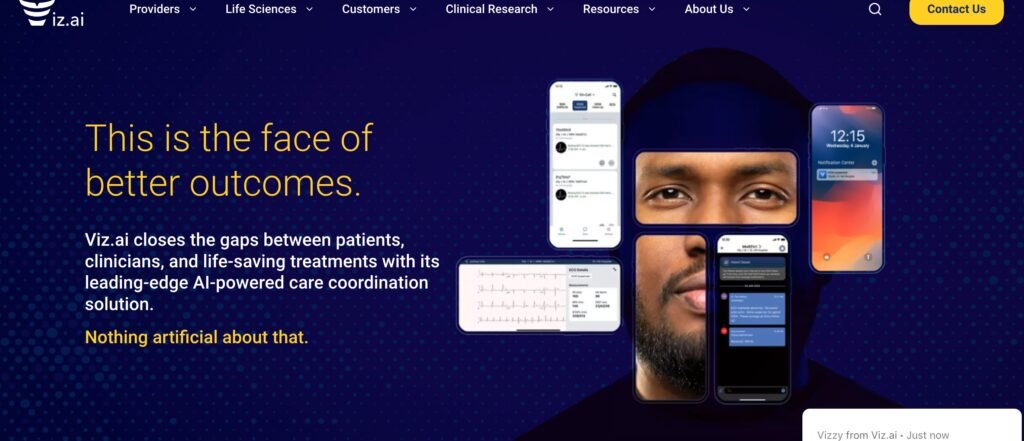
Stroke is a medical emergency that requires immediate intervention. Viz.ai is an AI medical software designed to expedite stroke detection and improve patient outcomes. The software uses AI algorithms to analyze brain images, rapidly identifying potential signs of stroke and alerting healthcare professionals. This innovative approach allows for prompt and timely treatment.
Traditionally, stroke detection heavily relies on the expertise of radiologists who manually review brain images for signs of stroke. However, this process can be time-consuming and prone to human error. Viz.ai automates this process, significantly reducing the time it takes to detect and diagnose strokes.
With Viz.ai, healthcare professionals can receive real-time notifications when potential stroke cases are detected. This enables them to initiate appropriate treatment measures promptly, such as administering clot-busting medications or performing surgical interventions. By reducing the time to treatment, Viz.ai aims to improve patient outcomes and minimize the long-term effects of strokes.
Enlitic: Unlocking the Power of Medical Images

Medical imaging plays a crucial role in diagnosing and monitoring various medical conditions. Enlitic, an AI medical software, leverages deep learning algorithms to analyze medical images with exceptional precision. By accurately recognizing patterns and anomalies in images, Enlitic can aid healthcare providers in identifying diseases more efficiently, ultimately leading to better patient outcomes.
Enlitic’s advanced image analysis capabilities have the potential to revolutionize medical imaging. For example, in the field of radiology, Enlitic can assist radiologists in detecting subtle abnormalities in X-rays, CT scans, and MRIs that may be indicative of diseases such as cancer or cardiovascular conditions.
Moreover, Enlitic’s ability to process and analyze large volumes of medical images allows for faster turnaround times, reducing the waiting period for patients and enabling healthcare providers to make timely treatment decisions. This can be particularly beneficial in urgent cases where early detection is crucial for successful intervention.
Regard: Predictive Healthcare Analytics

Regard utilizes predictive analytics and machine learning techniques to provide valuable insights into population health trends. By analyzing vast amounts of healthcare data, including patient records, Regard can help identify potential disease outbreaks, patterns, and trends. This AI medical software empowers healthcare organizations and policy-makers to make data-driven decisions, optimizing resource allocation and improving public health management.
Imagine a scenario where a healthcare organization wants to allocate resources for a flu vaccination campaign. Regard can analyze historical data, demographic information, and other relevant factors to predict the areas with the highest risk of flu outbreaks. This allows healthcare providers to strategically distribute vaccines and implement preventive measures, reducing the overall impact of the flu on the population.
Furthermore, Regard’s predictive capabilities extend beyond infectious diseases. The software can also analyze data related to chronic conditions, mental health, and lifestyle factors to identify at-risk populations and develop targeted intervention strategies. By proactively addressing health issues, healthcare organizations can improve population health outcomes and reduce healthcare costs.
Twill Health: Personalized Patient Care
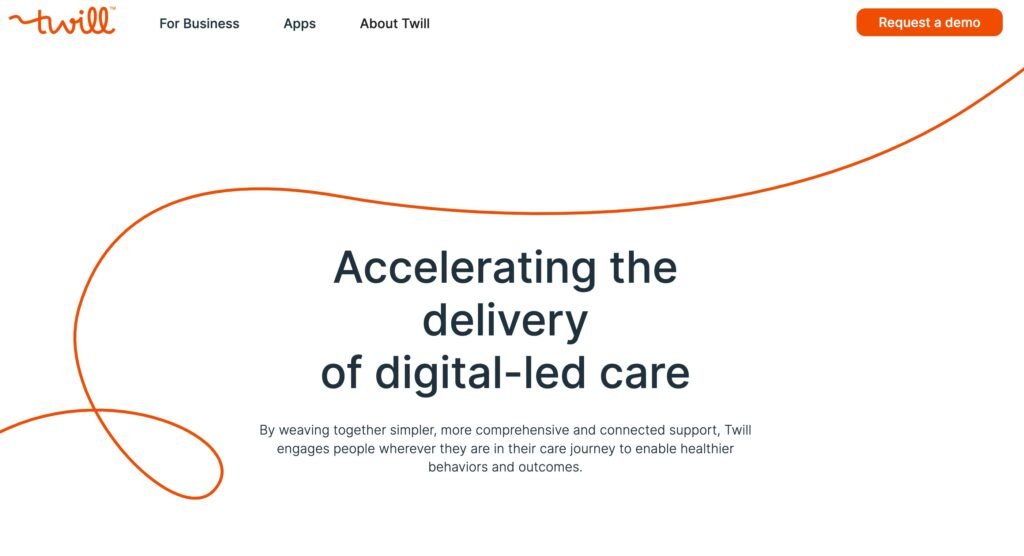
Each patient is unique, and their healthcare plans should reflect that. Twill Health is an AI medical software that aims to provide personalized patient care plans. By analyzing patient data, such as medical history, genetics, and lifestyle, Twill Health generates tailored treatment options and recommendations. This approach ensures that patients receive the most effective and personalized care.
Twill Health’s personalized care plans take into account various factors that influence a patient’s health. For example, if a patient has a genetic predisposition to a certain condition, Twill Health can recommend specific preventive measures or treatment options. Similarly, if a patient has lifestyle-related risk factors, such as smoking or sedentary behavior, Twill Health can provide personalized recommendations for behavior change.
By tailoring healthcare plans to individual patients, Twill Health aims to improve treatment adherence, patient satisfaction, and ultimately, health outcomes. Additionally, the software continuously learns from patient data and updates its recommendations, ensuring that the care plans remain up-to-date and aligned with the latest medical knowledge.
Linus Health: Brain Health Checkups Made Easy
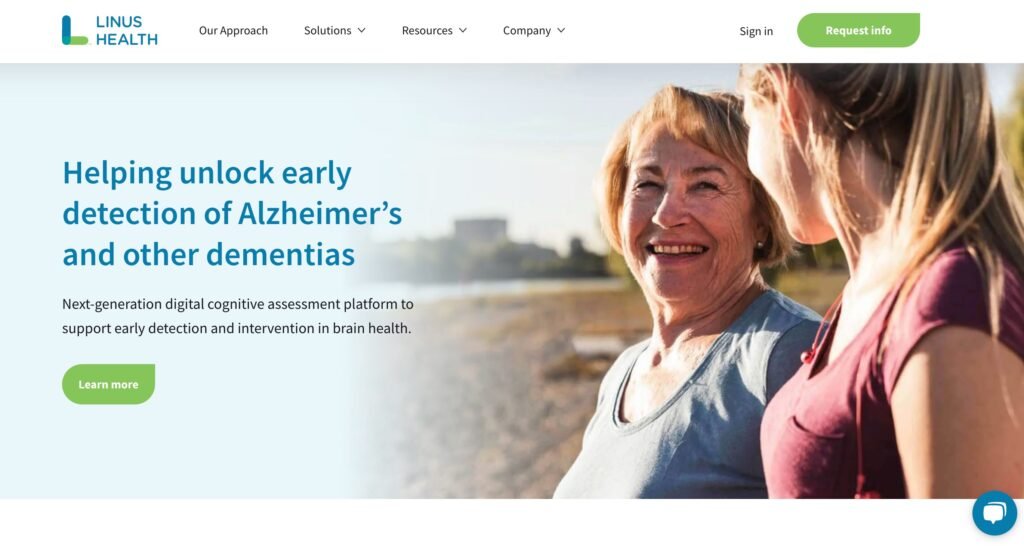
Linus Health is an AI medical software that simplifies brain health checkups. By leveraging AI algorithms, Linus Health can analyze various cognitive assessments and detect early signs of cognitive decline or neurodegenerative diseases. This allows healthcare professionals to intervene sooner and implement proactive treatment plans, ultimately improving brain health outcomes.
Regular brain health checkups are essential for early detection and intervention in conditions such as Alzheimer’s disease or dementia. However, these checkups often involve time-consuming and subjective assessments. Linus Health automates this process, making it more efficient and objective.
With Linus Health, healthcare professionals can administer standardized cognitive assessments to patients, such as memory tests or problem-solving tasks. The software then analyzes the results, comparing them to established norms and identifying any deviations. This enables early detection of cognitive decline and facilitates timely interventions, such as cognitive training programs or medication management.
PathAI: AI-Powered Pathology
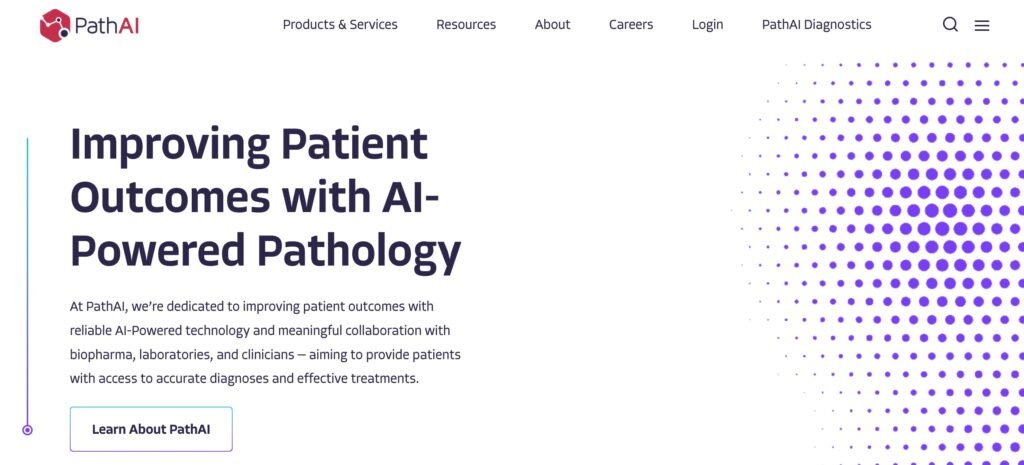
Pathology plays a crucial role in the diagnosis and treatment of diseases. PathAI employs AI algorithms to analyze pathology slides and assist pathologists in making accurate diagnoses. By automating certain tasks and providing digital assistance, PathAI reduces human error and enhances the efficiency of pathology practices.
Traditionally, pathologists manually review tissue samples under a microscope, looking for abnormal cellular structures or patterns that may indicate diseases such as cancer. This process can be time-consuming and subjective, leading to variability in diagnoses. PathAI aims to address these challenges by providing pathologists with AI-powered tools.
With PathAI, pathologists can digitally scan pathology slides and receive automated annotations and suggestions for potential diagnoses. The software can highlight areas of interest, quantify specific cellular features, and compare the findings to a vast database of pathology cases. This assists pathologists in making more accurate and consistent diagnoses, ultimately improving patient care and treatment planning.
Buoy Health: Reliable Symptom Checking

When faced with symptoms, individuals often turn to the internet for guidance, leading to inaccurate self-diagnosis. Buoy Health aims to change that by offering reliable symptom checking services. Using AI algorithms, Buoy Health can analyze symptoms and provide users with accurate and personalized healthcare advice, helping them make informed decisions about seeking medical care.
Buoy Health’s symptom checking platform takes a holistic approach to symptom analysis. Instead of relying solely on keyword matching, the software considers various factors, such as the severity and duration of symptoms, associated risk factors, and demographic information. This allows for more accurate and personalized assessments.
For example, if a user enters symptoms such as chest pain and shortness of breath, Buoy Health can analyze the data and provide a range of potential causes, from benign conditions like acid reflux to more serious conditions like a heart attack. The software also offers guidance on when to seek immediate medical attention and when self-care measures may be appropriate.
By providing reliable and evidence-based symptom checking, Buoy Health aims to empower individuals to make informed decisions about their health and reduce unnecessary healthcare utilization.
Freenome: Advancing Cancer Detection

Cancer detection and diagnosis are critical in improving patient outcomes. Freenome is an AI medical software that focuses on advancing cancer detection and prognosis. By analyzing blood samples, Freenome can detect potential cancer indicators and provide clinicians with actionable insights, aiming to detect cancer earlier and optimize treatment planning.
Traditional cancer screening methods, such as mammograms or colonoscopies, have limitations in terms of sensitivity and specificity. Freenome’s approach, known as liquid biopsy, offers a non-invasive and potentially more accurate alternative.
With Freenome, a simple blood sample can provide valuable information about a patient’s cancer status. The software analyzes the sample for specific genetic or molecular markers that are associated with various types of cancer. By detecting these markers, Freenome can identify individuals who may have early-stage cancer or a higher risk of developing cancer in the future.
Early detection is crucial in improving cancer outcomes, as it allows for timely interventions and more effective treatment strategies. Freenome’s AI-powered analysis provides clinicians with actionable insights, enabling them to develop personalized treatment plans and monitor treatment response more closely.
VirtuSense: Preventing Falls
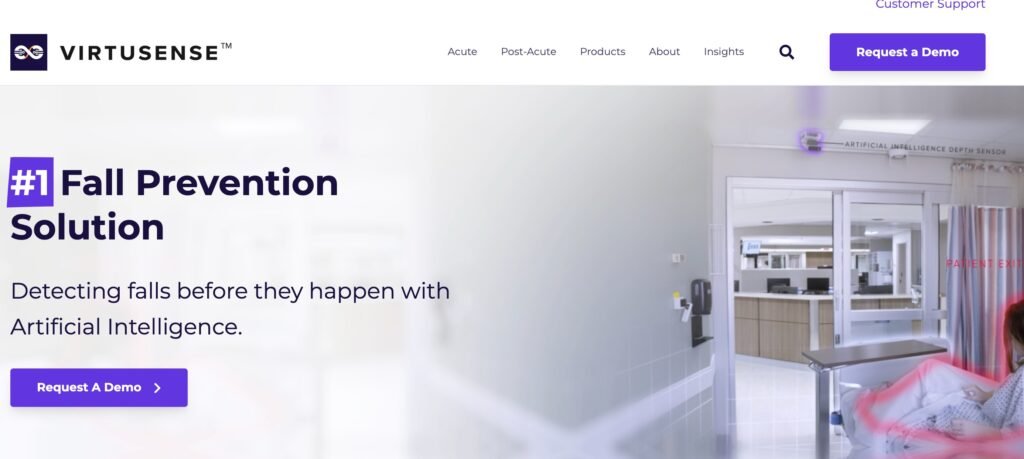
Falls can have severe consequences, especially for the elderly. VirtuSense is an AI medical software that utilizes sensor technology to detect movements and predict fall risks. By continuously monitoring patients’ movements, VirtuSense can provide early warnings and interventions, reducing the likelihood of falls and improving patient safety.
VirtuSense’s fall prevention system combines depth-sensing cameras and machine learning algorithms to analyze a person’s movements in real-time. The software can detect abnormal gait patterns, balance issues, or other factors that may increase the risk of falls.
Imagine a scenario where an elderly patient is at risk of falling due to muscle weakness or balance problems. VirtuSense can continuously monitor their movements and provide real-time feedback to both the patient and healthcare providers. The software can suggest exercises or interventions to improve balance and strength, reducing the risk of falls and promoting independent living.
By leveraging AI and sensor technology, VirtuSense aims to enhance fall prevention strategies and improve patient safety, particularly in settings such as nursing homes or rehabilitation centers.
Caption Health: Heart Disease Detection
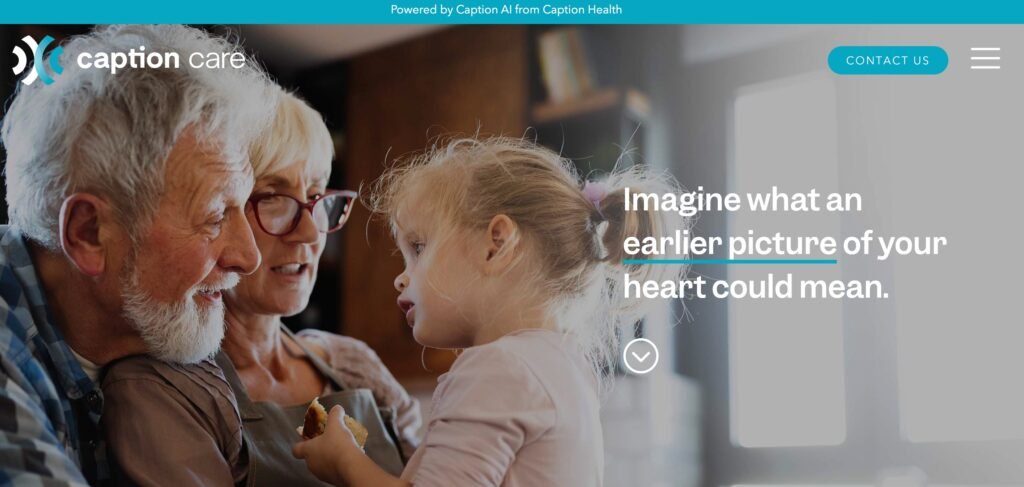
Caption Health harnesses the power of AI to enhance heart disease detection. Using ultrasound technology, Caption Health’s software provides real-time guidance and analysis to healthcare professionals during cardiac exams. This innovative approach enables clinicians to detect heart conditions more accurately and efficiently, ultimately improving patient outcomes.
Ultrasound imaging is commonly used to assess heart function and detect abnormalities. However, interpreting ultrasound images requires expertise and can be subjective. Caption Health’s software aims to address these challenges by providing real-time guidance and automated analysis.
With Caption Health, healthcare professionals can perform cardiac exams using ultrasound devices equipped with AI software. The software guides the user in obtaining the necessary images and automatically analyzes them for signs of heart disease, such as abnormal heart function or structural abnormalities.
By providing real-time feedback and automated analysis, Caption Health enables healthcare professionals with varying levels of expertise to perform high-quality cardiac exams. This enhances the accuracy and efficiency of heart disease detection, leading to more timely interventions and improved patient outcomes.
Tempus: Transforming Medical Imaging
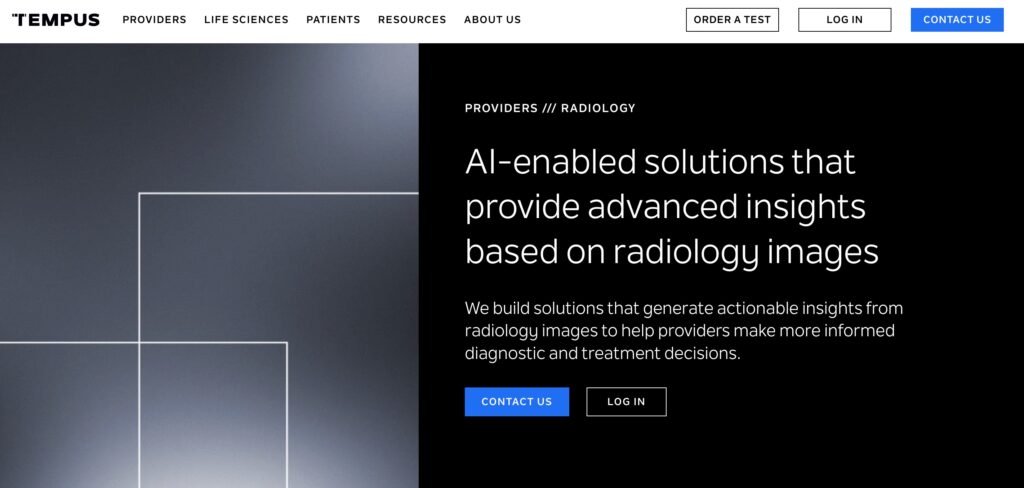
Medical imaging is crucial in diagnosing and monitoring various medical conditions. Tempus is an AI medical software that takes medical imaging to the next level. By utilizing deep learning algorithms, Tempus can analyze medical images in real-time, providing radiologists and other healthcare professionals with enhanced insights and increasing efficiency in diagnosis.
Traditional medical image analysis often involves manual measurements and visual assessments, which can be time-consuming and subjective. Tempus automates and augments this process, enabling faster and more accurate analysis.
With Tempus, radiologists can upload medical images, such as CT scans or MRIs, to the software platform. The software then applies deep learning algorithms to analyze the images, providing quantitative measurements, automated annotations, and even predictive analytics.
For example, in the field of cardiology, Tempus can analyze cardiac MRI images to measure specific parameters, such as ejection fraction or myocardial strain. This information is crucial for diagnosing and monitoring heart conditions. By automating these measurements, Tempus saves time for healthcare professionals and improves the consistency of results.
Overall, Tempus aims to enhance the efficiency and accuracy of medical imaging analysis, ultimately improving patient care and treatment planning.
Cleerly: Redefining Heart Imaging Technology

Heart imaging plays a vital role in diagnosing and managing heart conditions. Cleerly aims to redefine heart imaging technology through AI-powered analysis. By combining deep learning algorithms with advanced image processing techniques, Cleerly can accurately assess cardiac images, enabling healthcare professionals to make more precise and informed decisions in managing heart diseases.
Cardiac imaging, such as echocardiography or cardiac MRI, provides detailed information about the structure and function of the heart. However, interpreting these images can be challenging and time-consuming. Cleerly’s software aims to simplify and enhance this process.
With Cleerly, healthcare professionals can upload cardiac images for analysis. The software applies deep learning algorithms to detect and quantify specific cardiac features, such as chamber sizes, valve function, or myocardial viability. This automated analysis provides clinicians with objective measurements and insights, facilitating accurate diagnosis and treatment planning.
Furthermore, Cleerly’s software can compare a patient’s cardiac images to a vast database of similar cases, providing clinicians with comparative data and prognostic information. This allows for personalized risk assessment and the development of tailored treatment strategies.
By redefining heart imaging technology, Cleerly aims to improve the accuracy and efficiency of cardiac diagnoses, ultimately leading to better patient outcomes and quality of life.
Types of AI Used in the Medical Field
Several types of AI are utilized in the medical field to cater to different healthcare needs. Machine learning, natural language processing, and computer vision are among the prominent AI techniques used in medical software. These AI types enable medical software to learn from data, understand and derive insights from written text, and analyze medical images, respectively. By combining these AI types, medical software can provide comprehensive and efficient solutions to various medical challenges.
AI medical software is set to revolutionize the healthcare sector in 2024. With advancements in technology, these software solutions offer innovative ways to enhance medical diagnosis, streamline health data management, and improve patient care outcomes. As AI continues to evolve, the possibilities for transforming healthcare practices are limitless. Embracing AI in medicine will undoubtedly pave the way for a more streamlined, efficient, and patient-centric healthcare system.
As we stand on the brink of a healthcare revolution, your clinic has the opportunity to be at the forefront of this transformation. I am Angelo Rosati, CEO of Clinic Marketing AI, and my team is dedicated to integrating the power of AI into your healthcare marketing strategies. With a rich history in health tech and a commitment to excellence, we’re not just a service provider; we’re your partner in growth. If you’re ready to elevate your clinic’s patient care and operational efficiency with cutting-edge AI solutions, Book a Call with Us today. Together, we can redefine what’s possible in healthcare.


